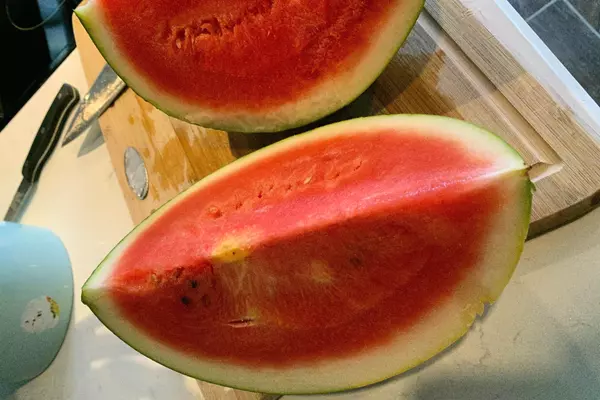Welcome to our blog post on how to tell if a watermelon is bad! Watermelon is a delicious and refreshing fruit that is enjoyed by people all over the world.
However, like all produce, watermelon can go bad if it is not stored or handled properly.
In this post, we will provide some tips on determining if a watermelon is still good to eat or has gone bad.
Whether you’re planning on serving watermelon at a summer barbecue or simply want to enjoy a healthy snack, it’s important to know how to identify a bad watermelon to avoid any potential food poisoning or illness. So read on to learn more about how to tell if a watermelon is bad!
Can Watermelon Go Bad And Make You Sick?
Yes, watermelon can go bad and potentially make you sick . Watermelon is a perishable food that can spoil if it is not stored or handled properly.
When watermelon goes bad, it can develop harmful bacteria, fungi, or other contaminants that can cause food poisoning or other illnesses if ingested.
There are several ways that watermelon can go bad, such as:
1. The Watermelon Has Been Left Out At Room Temperature For Too Long
Watermelon should be stored in the refrigerator to keep it fresh and prevent the growth of bacteria. If watermelon is left out at room temperature for an extended period of time, it can go bad and potentially make you sick if consumed.
2. The Watermelon Has Been Cut Open And Not Properly Stored
Once a watermelon has been cut open, it is more prone to spoilage because the flesh is exposed to the air and can become contaminated.
If a cut watermelon is not properly wrapped and stored in the refrigerator, it can go bad and potentially make you sick if consumed.
3. The Watermelon Has Been Damaged Or Bruised
Watermelon that has been damaged or bruised is more likely to go bad because the skin has been broken, allowing bacteria and other contaminants to enter the flesh of the fruit. If a watermelon is damaged or bruised, it is best to discard it to prevent the risk of illness.
To avoid getting sick from bad watermelon, it is important to properly store and handle the fruit and to discard any watermelon that looks or smells spoiled.
How to Tell if a Watermelon Is Bad
7 Signs That Watermelon Has Gone Bad
Here are seven signs that watermelon may have gone bad:
1. The Watermelon Has A Sour Or Off Smell
If a watermelon has an unusual or unpleasant smell, it may be a sign that it has gone bad. A fresh watermelon should have a pleasant, sweet smell.
2. The Watermelon Has A Slimy Or Slimy Texture
If a watermelon has a slimy or slippery texture, it may be a sign that it has gone bad. A fresh watermelon should have firm, crisp flesh.
3. The Watermelon Has Mold
If a watermelon has visible mold on the skin or flesh, it is definitely bad and should be discarded.
4. The Watermelon Has A Fermented Or Alcoholic Smell
If a watermelon has a fermented or alcoholic smell, it may be a sign that it has gone bad. This can occur if the watermelon has been left out at room temperature for an extended period of time and has started to ferment.
5. The Watermelon Has Soft Or Mushy Spots
If a watermelon has soft or mushy spots, it may be a sign that it has gone bad. A fresh watermelon should be firm and solid throughout.
6. The Watermelon Has An Off Or Rancid Taste
If a watermelon has an off or rancid taste, it may be a sign that it has gone bad. A fresh watermelon should have a sweet and refreshing taste.
7. The Watermelon Has A Shrunken Or Shriveled Appearance
If a watermelon has a shrunken or shriveled appearance, it may be a sign that it has gone bad. A fresh watermelon should be plump and full.
If you notice any of these signs, it is best to discard the watermelon to avoid the risk of illness.

Is It Ok To Eat An Overripe Watermelon?
An overripe watermelon is a watermelon that has reached the end of its shelf life and is no longer fresh. While eating an overripe watermelon is not necessarily harmful, it may not taste as good as a fresh one and may not provide the same nutritional benefits.
An overripe watermelon may have softer, more wrinkled skin and softer, more fibrous flesh than a fresh watermelon. It may also have a duller color and a less sweet or flavorful taste.
While it is generally safe to eat an overripe watermelon, you may want to avoid eating it if it has visible signs of spoilage, such as mold or an off smell or taste. If a watermelon has any of these signs, it is best to discard it to avoid the risk of illness.
What Happens If You Eat Bad Watermelon?
Eating bad watermelon can cause food poisoning or other illnesses. When watermelon goes bad, it can develop harmful bacteria, fungi, or other contaminants that can cause food poisoning or other illnesses if ingested.
Symptoms of food poisoning from a bad watermelon may include:
- Nausea
- Vomiting
- Diarrhea
- Stomach pain
- Fever
- Dehydration
In severe cases, food poisoning from bad watermelons can lead to hospitalization.
To avoid getting sick from bad watermelon, it is important to properly store and handle the fruit and to discard any watermelon that looks or smells spoiled. If you are unsure whether a watermelon is still good to eat, it is best to err on the side of caution and throw it away.
How Long Is An Uncut Watermelon Good For?
An uncut watermelon can last several days to a week or more if stored properly. Watermelon is a perishable fruit that should be stored in the refrigerator to keep it fresh.
To store an uncut watermelon, place it in a cool, dry place, such as on the kitchen counter or in the pantry. Avoid storing it in direct sunlight or in a warm place, as this can cause the watermelon to spoil faster.
How Long Is Watermelon Ok In The Fridge?
An uncut watermelon can last for several days to a week or more in the refrigerator. To store an uncut watermelon in the refrigerator, wrap it in plastic wrap or place it in a plastic bag to keep it fresh.
A cut watermelon will not last as long as an uncut watermelon in the refrigerator. Cut watermelon should be wrapped in plastic wrap or placed in an airtight container and stored in the refrigerator. A cut watermelon will typically last for 3-5 days in the refrigerator.
To extend a cut watermelon’s shelf life, remove any excess moisture from the surface of the flesh. This can be done by patting the cut surface with a paper towel.
Should You Refrigerate Whole Uncut Watermelon?
It is generally recommended to store uncut watermelon in the refrigerator to keep it fresh. Watermelon is a perishable fruit that should be stored in a cool, dry place to prevent spoilage.
The refrigerator is a good place to store uncut watermelon because it is cool and dry, which helps extend the fruit’s shelf life.
To store an uncut watermelon in the refrigerator, wrap it in plastic wrap or place it in a plastic bag to keep it fresh. An uncut watermelon can last for several days to a week or more in the refrigerator if it is stored properly.
If you do not have room in your refrigerator to store an uncut watermelon, you can store it in a cool, dry place, such as on the kitchen counter or in the pantry.
However, an uncut watermelon stored at room temperature will not last as long as one stored in the refrigerator, and it may spoil faster.
It is important to regularly check on the watermelon to ensure that it is still fresh. If the watermelon has an unusual or unpleasant smell or visible signs of spoilage, such as mold or soft or mushy spots, it should be discarded to avoid the risk of illness.
Conclusion
In conclusion, it is important to know how to tell if a watermelon is bad to avoid the risk of food poisoning or other illnesses. Watermelon is a perishable fruit that can go bad if it is not stored or handled properly.
There are several signs that watermelon may have gone bad, such as a sour or off smell, a slimy or slimy texture, visible mold, or an off or rancid taste. If you notice any of these signs, it is best to discard the watermelon to avoid the risk of illness.
To ensure that you are getting the freshest and most nutritious watermelon, choosing a watermelon that is firm, heavy for its size, and has smooth, unblemished skin is best. Avoid watermelons that are soft, shriveled, or have visible signs of spoilage.
It is also a good idea to store watermelon in the refrigerator to keep it fresh and to properly handle and store cut watermelon to prevent spoilage. By following these tips, you can enjoy watermelon safely and confidently.
- Jet’s Ranch Recipe: Make The Famous Dip At Home - April 12, 2025
- James Hemings Macaroni And Cheese Recipe – History On A Plate - April 3, 2025
- French Dip Squares Recipe – Better Than A Sandwich! - March 25, 2025



1 thought on “Don’t Get Sick: How To Tell If A Watermelon Is Bad?”